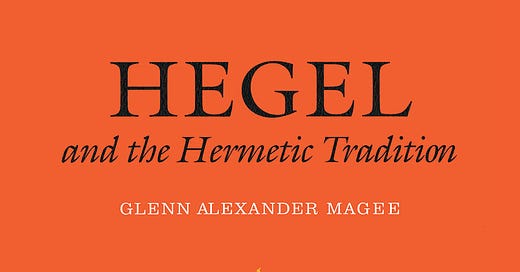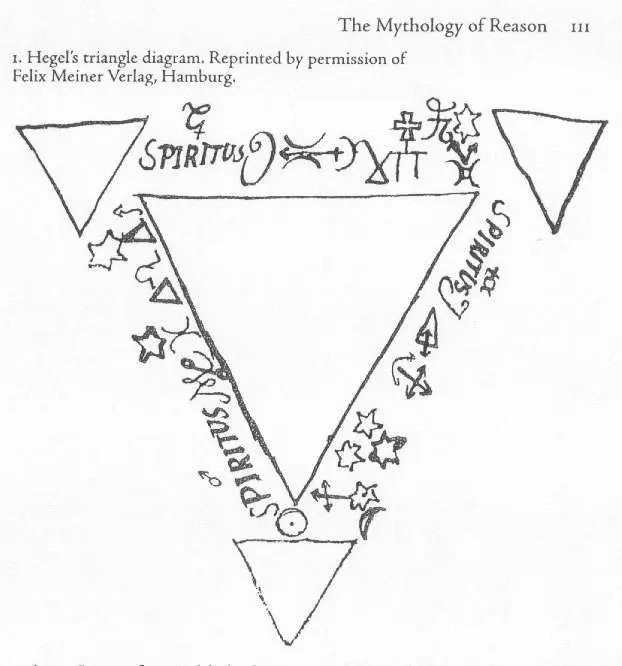The thing that will make me return to this book isn’t necessarily its interpretation of Hegel but its exciting, often beautiful descriptions of the spiritual and intellectual atmosphere that buoyed forth much of his development.
Review
Hegel and the Hermetic Tradition, by Glenn Alexander Magee, draws Hegel as the consummation of an intense strain of Swabian Pietism and medieval Hermeticist thought, via Paracelsus, Böhme, Oetinger, Eckhart and Bruno.
Magee does a great job illuminating opaque and otherwise strange imagery in Hegel’s papers. The famous triangle diagram, included below, is shown to be a kind of collection of mathemes for the conceptual explication of what will later become Hegel’s developed system. Phenomenology of Spirit is described as an initiation rite to the greater cycle of The Encyclopedia of Philosophical Sciences, with the Logic, the Philosophy of Nature and the Philosophy of Spirit corresponding, respectively, to the moments of the Trinity.
Here’s a line that I particularly liked. It compares favorably with certain (basically “resolute”) readings of Wittgenstein’s Tractatus Logico-Philosophicus (specifically chapter 6 of Marie McGinn’s Elucidating the Tractatus, “The Opening of the Tractatus”).
Hegel’s science further distinguishes itself from philosophy by containing nothing that could conventionally be called “proof” or argumentation. It is a self-grounding speech.
Another incidental piece of praise for the book: Magee does not once make the mistake of attributing the structure of thesis–antithesis–synthesis to Hegel as his supposed “dialectic”. Magee points this out himself in a footnote. For me, this is always the single greatest indicator of whether to take someone’s reading of Hegel seriously at a minimum level. (The thesis–antithesis–synthesis triad is found only once in Hegel, and as an explicit criticism of Fichte, who actually developed it.)
For me, the shoddiest aspect of the book is the regular and somewhat inexplicable references to Julius Evola—he comes up around ten times, usually by way of his book The Hermetic Tradition, and never in a way that adds to Magee’s already strong thesis or makes the book any deeper in its imagery. The sections on Böhme—possibly the most fascinating in the entire book and among the most exciting explications I have read within the last year—served both of these ends very well.
If you don’t know who Julius Evola is, he is the prime example of Fascist pseudo-spiritualism. To briefly quote from his Wikipedia page:
He fled to Nazi Germany in 1943 when the Italian Fascist regime fell, but returned to Rome under the puppet Salò government to organize a radical-right group. [. . .] On trial in 1951, Evola denied being a fascist and instead referred to himself as "superfascista" (lit. 'superfascist').
[. . .]
In 1945 in Vienna, a Soviet shell fragment paralysed him from the waist down.
Evola name-drops notwithstanding—Magee’s reading will certainly stay with me, although the picture it painted felt a little too complete, so delimited, in fact, that I can’t help but feel somewhat suspicious about it. That might, however, just say more about me as a reader.
The thing that will make me return to this book isn’t necessarily its interpretation of Hegel but its exciting, often beautiful descriptions of the spiritual and intellectual atmosphere that buoyed forth much of his development.
Suggestions for further reading
If you have not already read Hegel but want to, here is what I would recommend.
These texts give a clear layout of problems Hegel was dealing with and the other thinkers around him, with whom he corresponded, thought alongside and against—and even grew up with.
Keep reading with a 7-day free trial
Subscribe to COM-POSIT to keep reading this post and get 7 days of free access to the full post archives.






